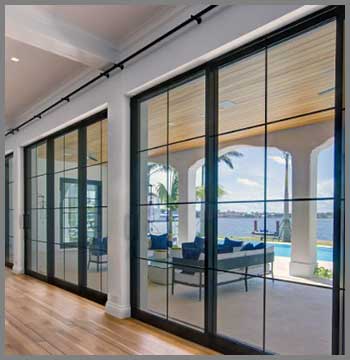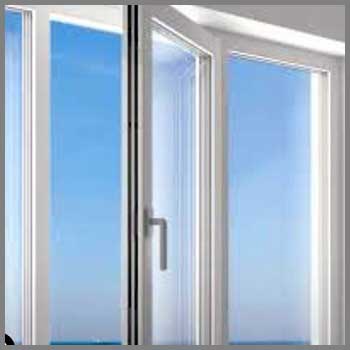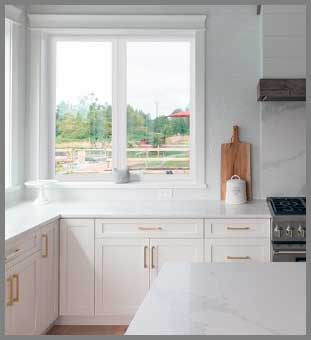
As a homeowner in a hurricane-prone area, I’ve spent countless hours researching windows that can withstand nature’s fury while keeping my home stylish and energy-efficient.
In this article, I’ll share my journey comparing ES Windows and CGI Windows, two leading brands in impact-resistant window solutions.
You’ll get a clear, engaging breakdown of their strengths and weaknesses, a detailed comparison table, and practical insights from my experience.
My goal is to help you make an informed decision about which windows suit your needs, balancing durability, aesthetics, and cost.
Comparison Table: ES Windows Vs CGI Windows
| Feature | ES Windows | CGI Windows |
|---|---|---|
| Impact Resistance | High-impact laminated glass, meets stringent hurricane codes | Advanced laminated glass, exceeds Miami-Dade standards |
| Energy Efficiency | Excellent insulation with Low-E coatings | Superior U-factor ratings, advanced Low-E options |
| Design Options | Wide range of styles, customizable frames | Extensive customization, modern and traditional designs |
| Cost | Moderately priced, $500-$1,200 per window | Premium pricing, $800-$1,500 per window |
| Warranty | 10-year limited warranty | Lifetime limited warranty on frame and glass |
| Installation | Professional installation, some DIY options | Requires certified installers, complex process |
| Noise Reduction | Good, with laminated glass | Excellent, with thicker glass options |
| Durability | Robust aluminum frames, corrosion-resistant | High-grade aluminum, enhanced corrosion resistance |
My Experience With ES Windows
When I first considered upgrading my home’s windows, ES Windows caught my attention due to their reputation for affordability and solid performance in harsh climates.
I live in South Florida, where hurricanes are a yearly concern, so I needed windows that could handle high winds and flying debris without breaking the bank. After installing ES Windows in my living room and bedrooms, I was impressed by their sturdy build and sleek appearance.
The installation process was straightforward. I hired a local contractor, though I noticed ES Windows offers some flexibility for DIY enthusiasts with smaller projects. The windows’ aluminum frames felt durable, and the laminated glass gave me peace of mind during storm season.
I opted for their Low-E coating, which noticeably reduced heat gain in my home, keeping my air conditioning bills lower than expected. The variety of styles—casement and single-hung—allowed me to match my home’s modern aesthetic.
However, I did encounter a few hiccups. The customization process wasn’t as seamless as I’d hoped; I had to wait longer for a specific color finish. Also, while the windows are quiet, they don’t block noise as effectively as I expected in a busy neighborhood. Overall, ES Windows delivered reliable performance at a reasonable price, making them a practical choice for budget-conscious homeowners like me.
Pros Of ES Windows

- Affordable Pricing: ES Windows are priced between $500 and $1,200 per window, making them a cost-effective option for homeowners seeking hurricane protection without premium costs.
- Strong Impact Resistance: Their laminated glass meets strict hurricane codes, including Miami-Dade standards, ensuring protection against high winds and debris.
- Energy Efficiency: Low-E coatings and insulated frames reduce heat transfer, lowering energy bills by up to 15% in hot climates.
- Variety Of Styles: From casement to fixed windows, ES offers multiple designs to suit modern and traditional homes, with customizable frame colors.
- Corrosion Resistance: Aluminum frames are treated to withstand coastal environments, reducing wear from salt and humidity.
- Ease Of Installation: Professional installation is recommended, but smaller windows allow for DIY options, saving on labor costs.
- Low Maintenance: The powder-coated frames resist fading and require minimal upkeep, ideal for busy homeowners.
I found the balance of cost and performance particularly appealing. The energy savings were noticeable within months, and the windows held up well during a recent tropical storm, with no leaks or damage. The range of styles let me maintain my home’s curb appeal, which was a big win.
Also read: My Thoughts on Floor & Decor Vs. Home Depot
Cons Of ES Windows
- Limited Customization Options: While ES offers various styles, the customization process for unique colors or finishes can be slow and restrictive.
- Moderate Noise Reduction: The laminated glass reduces noise, but it’s less effective in high-traffic areas compared to premium brands.
- Warranty Duration: The 10-year limited warranty is decent but falls short of competitors offering lifetime coverage.
- Frame Thickness: Some models have bulkier frames, which may not suit minimalist home designs.
- Lead Times: Custom orders can take 6-8 weeks, which might delay projects with tight timelines.
- Glass Clarity: The laminated glass can have a slight tint, affecting visibility in certain lighting conditions.
- Installation Costs: While DIY is possible, professional installation fees can add $200-$400 per window, increasing overall costs.
My biggest frustration was the wait time for a custom bronze finish, which pushed my project back by a month. The noise reduction was adequate but didn’t fully muffle the sounds of nearby traffic, which was a minor letdown.
Maintenance Tips For ES Windows
- Regular Cleaning: Wash the glass with a mild soap solution and a soft cloth every 3-4 months to prevent dirt buildup and maintain clarity.
- Frame Inspection: Check aluminum frames annually for signs of corrosion, especially in coastal areas, and apply a protective wax to enhance durability.
- Lubricate Moving Parts: Apply silicone-based lubricant to hinges and tracks of casement or sliding windows twice a year for smooth operation.
- Seal Checks: Inspect weatherstripping and seals every 6 months to ensure they remain intact, preventing leaks during storms.
- Avoid Harsh Chemicals: Use non-abrasive cleaners to avoid damaging the powder-coated finish or Low-E coatings.
- Debris Removal: Clear tracks and sills of debris monthly to prevent obstruction and ensure proper drainage during heavy rain.
- Professional Servicing: Schedule a professional inspection every 2-3 years to assess glass integrity and frame alignment.
Maintaining my ES Windows has been relatively easy. A quick wash every few months keeps them sparkling, and lubricating the tracks ensures smooth sliding. I’ve made it a habit to check the seals before hurricane season, which has helped avoid any water intrusion issues.
My Experience With CGI Windows
CGI Windows came highly recommended by a neighbor who’d installed them years ago and raved about their durability. I decided to test them in my sunroom and kitchen, areas where I wanted both style and top-tier protection. From the moment they were installed, I could tell CGI was a premium product. The windows felt heavier, with thicker glass and sleeker frames that gave my home a polished look.
The installation required certified professionals, which added to the cost but ensured precision. I chose CGI’s Sentinel series with advanced Low-E glass, and the energy efficiency was immediately noticeable—my kitchen stayed cooler even during peak summer.
The noise reduction was a standout; the thicker glass significantly dampened street noise, creating a quieter indoor environment. However, the price tag was steep, and the lead time for delivery was longer than I’d anticipated. Despite these drawbacks, CGI’s premium feel and performance made them a worthwhile investment for high-traffic areas of my home.
Pros Of CGI Windows

- Superior Impact Resistance: CGI’s laminated glass exceeds Miami-Dade standards, offering exceptional protection against hurricanes and debris.
- Outstanding Energy Efficiency: Advanced Low-E coatings and low U-factor ratings reduce heat gain, cutting energy costs by up to 20%.
- Excellent Noise Reduction: Thicker glass and robust frames significantly reduce external noise, ideal for urban settings.
- Extensive Customization: CGI offers a wide range of frame finishes, glass tints, and styles, from modern to classic, for personalized designs.
- Lifetime Warranty: A lifetime limited warranty on frames and glass provides long-term peace of mind.
- Premium Aesthetics: Sleek, high-grade aluminum frames enhance curb appeal and suit upscale home designs.
- Enhanced Durability: Corrosion-resistant coatings make CGI windows ideal for harsh coastal environments.
The noise reduction was a game-changer in my kitchen, where street noise used to be a constant annoyance. The lifetime warranty also gave me confidence that CGI stands behind their product, and the sleek design elevated my home’s exterior.
Cons Of CGI Windows
- High Cost: Prices range from $800 to $1,500 per window, making CGI a significant investment for budget-conscious homeowners.
- Complex Installation: Requires certified installers, increasing labor costs by $300-$500 per window.
- Long Lead Times: Custom orders can take 8-12 weeks, which may not suit urgent projects.
- Heavy Frames: Thicker frames can feel bulky in smaller spaces, impacting design flexibility.
- Limited DIY Options: Installation complexity makes DIY impractical for most homeowners.
- Premium Maintenance: Specialized cleaning solutions are recommended to preserve high-end finishes, adding to upkeep costs.
- Availability: CGI products may not be as widely available in some regions, complicating sourcing.
The cost was the biggest hurdle for me; I had to adjust my budget to accommodate CGI in just a few rooms. The long wait for delivery also tested my patience, but the final product was worth it for the quality.
Maintenance Tips For CGI Windows
- Gentle Cleaning: Use a mild detergent and microfiber cloth to clean glass every 3 months, avoiding scratches on premium finishes.
- Frame Protection: Apply a UV-protectant wax to aluminum frames annually to maintain corrosion resistance in coastal areas.
- Track Lubrication: Use a silicone-based lubricant on sliding window tracks every 6 months for smooth operation.
- Seal Inspections: Check weatherstripping and caulking every 4-6 months to ensure airtight seals during storms.
- Avoid Abrasive Tools: Use soft sponges or cloths to prevent damaging the advanced Low-E coatings or frame finishes.
- Debris Management: Clear sills and tracks monthly to prevent water buildup and ensure proper drainage.
- Professional Maintenance: Schedule a certified technician every 2 years to inspect glass and frame integrity for optimal performance.
Maintaining CGI Windows requires a bit more care due to their premium finishes, but it’s manageable. I use a microfiber cloth for cleaning to avoid scratches, and checking the seals before storms has kept my sunroom dry and secure.
Read more: My Thoughts on Hearth Vs. Greensky
Comparison With Other Brands
- PGT Windows: PGT offers similar hurricane resistance but focuses on vinyl frames, which are less durable than ES or CGI’s aluminum but more affordable, starting at $400 per window.
- Andersen Windows: Known for energy efficiency, Andersen’s impact windows are pricier than ES but lack CGI’s lifetime warranty, with costs around $700-$1,300.
- Hurd Windows: Hurd provides high-end wood frames with impact glass, but maintenance is higher than ES or CGI, and prices start at $900.
- Simonton Windows: Simonton’s vinyl impact windows are budget-friendly ($350-$800) but offer less customization than ES or CGI.
- Marvin Windows: Marvin excels in aesthetic customization but is less focused on hurricane resistance, with prices similar to CGI ($800-$1,400).
- Kolbe Windows: Kolbe’s impact windows are stylish but have shorter warranties (5-10 years) compared to CGI’s lifetime coverage.
- Jeld-Wen Windows: Jeld-Wen offers affordable impact windows ($450-$1,000) but lacks the premium durability of CGI or ES’s cost-effectiveness.
ES and CGI stand out for their aluminum frames and hurricane resistance, but PGT and Simonton are strong contenders for budget-conscious buyers. CGI’s premium features make it a top choice for luxury homes, while ES balances cost and performance effectively.
Frequently Asked Questions (FAQ)
Yes, ES Windows are reliable for hurricane protection, offering strong impact resistance and energy efficiency at a moderate price.
CGI Windows are often considered the best for their superior durability, lifetime warranty, and excellent noise reduction, though cost is higher.
CGI Windows are excellent, with top-tier impact resistance, energy efficiency, and premium aesthetics, ideal for high-end homes.
ES Windows stands for Energy Saving Windows, reflecting their focus on energy-efficient, impact-resistant designs.
Conclusion: For ES Windows And CGI Windows
Choosing between ES Windows and CGI Windows depends on your priorities. If you’re looking for a cost-effective, reliable option, ES Windows deliver solid hurricane protection and energy savings without breaking the bank.
For those seeking premium quality, CGI’s superior durability, noise reduction, and lifetime warranty make them worth the investment. Both brands excel in harsh climates, but your budget and aesthetic preferences will guide your decision. I hope my insights help you find the perfect windows for your home, ensuring safety and style for years to come.
